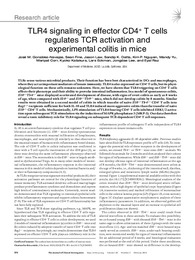Please use this identifier to cite or link to this item:
https://hdl.handle.net/11000/35483Full metadata record
| DC Field | Value | Language |
|---|---|---|
| dc.contributor.author | González Navajas, José Manuel | - |
| dc.contributor.author | Fine, Sean | - |
| dc.contributor.author | Law, Jason | - |
| dc.contributor.author | Datta, Sandip | - |
| dc.contributor.author | Nguyen, Kim P. | - |
| dc.contributor.author | Yu, Mandy | - |
| dc.contributor.author | Corr, Maripat | - |
| dc.contributor.author | Katakura, Kyoko | - |
| dc.contributor.author | Eckman, Lars | - |
| dc.contributor.author | Lee, Jongdae | - |
| dc.contributor.author | Raz, Eyal | - |
| dc.contributor.other | Departamentos de la UMH::Farmacología, Pediatría y Química Orgánica | es_ES |
| dc.date.accessioned | 2025-01-30T07:40:02Z | - |
| dc.date.available | 2025-01-30T07:40:02Z | - |
| dc.date.created | 2010-02 | - |
| dc.identifier.citation | J Clin Invest. 2010;120(2):570–581 | es_ES |
| dc.identifier.issn | 1558-8238 | - |
| dc.identifier.issn | 0021-9738 | - |
| dc.identifier.uri | https://hdl.handle.net/11000/35483 | - |
| dc.description.abstract | TLRs sense various microbial products. Their function has been best characterized in DCs and macrophages, where they act as important mediators of innate immunity. TLR4 is also expressed on CD4+ T cells, but its physiological function on these cells remains unknown. Here, we have shown that TLR4 triggering on CD4+ T cells affects their phenotype and their ability to provoke intestinal inflammation. In a model of spontaneous colitis, Il10-/-Tlr4-/- mice displayed accelerated development of disease, with signs of overt colitis as early as 8 weeks of age, when compared with Il10-/- and Il10-/-Tlr9-/- mice, which did not develop colitis by 8 months. Similar results were obtained in a second model of colitis in which transfer of naive Il10-/-Tlr4-/- CD4+ T cells into Rag1-/- recipients sufficient for both IL-10 and TLR4 induced more aggressive colitis than the transfer of naive Il10-/- CD4+ T cells. Mechanistically, LPS stimulation of TLR4-bearing CD4+ T cells inhibited ERK1/2 activation upon subsequent TCR stimulation via the induction of MAPK phosphatase 3 (MKP-3). Our data therefore reveal a tonic inhibitory role for TLR4 signaling on subsequent TCR-dependent CD4+ T cell responses. | es_ES |
| dc.format | application/pdf | es_ES |
| dc.format.extent | 12 | es_ES |
| dc.language.iso | eng | es_ES |
| dc.publisher | American Society for Clinical Investigation | es_ES |
| dc.rights | info:eu-repo/semantics/openAccess | es_ES |
| dc.rights | Attribution-NonCommercial-NoDerivatives 4.0 Internacional | * |
| dc.rights.uri | http://creativecommons.org/licenses/by-nc-nd/4.0/ | * |
| dc.title | TLR4 signaling in effector CD4+ T cells regulates TCR activation and experimental colitis in mice | es_ES |
| dc.type | info:eu-repo/semantics/article | es_ES |
| dc.relation.publisherversion | 10.1172/JCI40055 | es_ES |

View/Open:
TLR4 signaling in effector CD4 T cells regulates TCR activation and experimental colitis in mice-annotated.pdf
3,05 MB
Adobe PDF
Share:
.png)
